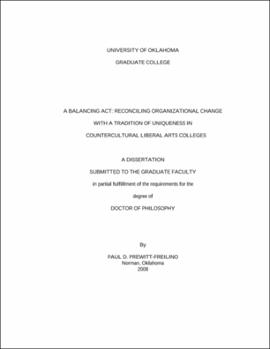| dc.contributor.advisor | Tan, David | |
| dc.creator | Prewitt-Freilino, Paul David | |
| dc.date.accessioned | 2019-04-27T21:24:07Z | |
| dc.date.available | 2019-04-27T21:24:07Z | |
| dc.date.issued | 2008 | |
| dc.identifier | 99158053202042 | |
| dc.identifier.uri | https://hdl.handle.net/11244/318588 | |
| dc.description.abstract | The current investigation explores the impact of societal shifts in commercialism and consumerism on lesser-known colleges with a tradition of liberal arts education. I present a descriptive case study that examines the perspectives of a total of 39 faculty, students, and administrators at two countercultural liberal arts colleges in the Northeastern United States, which continue to successfully balance external demands with their commitments to liberal arts education. Findings suggest a model for change in which all stakeholders focus on their shared institutional goals to creatively address challenges in a way that supports their commitment to liberal arts education. Both case institutions improved their financial positions and achieved record levels of enrollment by involving their campuses in effective planning and self-assessment, and as a result, redefined the role of liberal arts education for the twenty-first century. | |
| dc.format.extent | 286 pages | |
| dc.format.medium | application.pdf | |
| dc.language | en_US | |
| dc.relation.requires | Adobe Acrobat Reader | |
| dc.subject | Education, Humanistic--United States | |
| dc.subject | Small colleges--United States--Sociological aspects | |
| dc.subject | Universities and colleges--United States--Administration | |
| dc.subject | Organizational change | |
| dc.title | A Balancing Act: Reconciling Organizational Change with a Tradition of Uniqueness in Countercultural Liberal Arts Colleges | |
| dc.type | text | |
| dc.type | document | |
| dc.thesis.degree | Ph.D. | |
| ou.group | Jeannine Rainbolt College of Education::Department of Educational Leadership and Policy Studies | |
